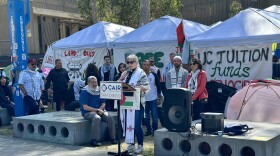It’s been four decades since Marine veterans John J. Valdez and Douglas Potratz were side-by-side in Vietnam. Both were stationed as security guards at the U.S. Embassy in Saigon, where they helped evacuate more than 7,000 people during the final 31 hours of the war.
The two men recently reunited at Valdez’s Oceanside home to reminisce about their time in Vietnam and make plans to return to the country on the 40th anniversary of the fall of Saigon on April 30, 1975.
Valdez’s home is filled with memorabilia from the war. There’s a map of Vietnam above the fireplace and pictures of their unit taped to the mantle. The two men look through boxes of photos. Many of them Valdez snapped as the historic airlift known as Operation Frequent Wind was underway.
Valdez, now 77, was a 37-year-old master gunnery sergeant and the noncommissioned officer in charge of the Marine Security Guards. He would also be the last Marine to leave Saigon in the last helicopter airlift from the roof of the U.S. Embassy.
He said people began rushing toward the embassy after Tan Son Nhut Air Base was bombed.
"People were panicking. They didn't know exactly what was taking place,” Valdez said.
“As the North Vietnamese started moving closer into Saigon, it seems like that all the villages and cities on the outlying areas and all the people started coming toward Saigon ... the main road that led to Saigon,” he said.
The photos Valdez shares with Potratz show the chaotic scene they saw unfold —helicopters landing on the roof of the embassy and in the parking lot, evacuees lining up, and crowds of people attempting to breach the embassy compound.
For Potratz, who was a 21-year-old sergeant in 1975, the war and its final hours made the South Dakota native grow up quickly.
“The people were so scared. I felt so sorry for them,” said Potratz, who lives in Santa Ana. “I wish we could have gotten some more out, but we just couldn’t. At some point, the helicopters had to stop.”
Eventually the order was given to end the airlifts. Valdez and his men then retreated to the embassy rooftop to wait for the final helicopters. On the roof, Potratz said they could see how the city was unraveling below.
“I had never seen a looting before, and they were literally looting the building that we were in," Potratz said. "People were running around stealing cars, driving off. There was smoke, there were bombs going off. It looked like the end of the world.”
He said it felt like he was watching the death of a city.
“When we got to the ship, we found out they later renamed the city Ho Chi Minh City (after the Communist leader of the North Vietnamese), so Saigon had died, died right in front of us, hours before the communists came in. I didn’t think we’d ever go back," Potratz said.
But 40 years later, the men are returning to Vietnam, along with other members of the Marine Security Guards. They’ll place a commemorative plaque at the site of the former embassy to honor two fellow Marines who didn’t make it back.
Cpl. Charles McMahon and Lance Cpl. Darwin Judge were both killed in the final hours of the war. Their bodies remained behind for almost a year before they were returned to their families.
For the 61-year-old Potratz, the upcoming trip is personal. Judge got Potratz's Vietnamese wife and 4-year-old stepdaughter evacuated out of Tan Son Nhut Airbase before it shutdown.
“He said, 'I know the guy who fills out the plane manifest. Give me your paperwork and I’ll get your family on the next flight out,'” Potratz recalled. “My wife had a suitcase and I had a suitcase, and he picked up Becky (the stepdaughter) … and put her on his back and helped by carrying her out to the airplane so we could all run out of there. He was my hero that day.”
For some of the more than 7,000 people evacuated from the U.S. Embassy in the final two days of the war, the Marines guarding the compound were thought of as heroes. But they came home to a country divided over the war.
Potratz remembers how difficult that was.
“Yeah, we were rejected as veterans, but it was a sad war. It was the first war we technically lost. And the Americans, they just wanted to put it behind them. ... And I guess you can’t blame them," he said. "But it’s something that stays with you.”





















